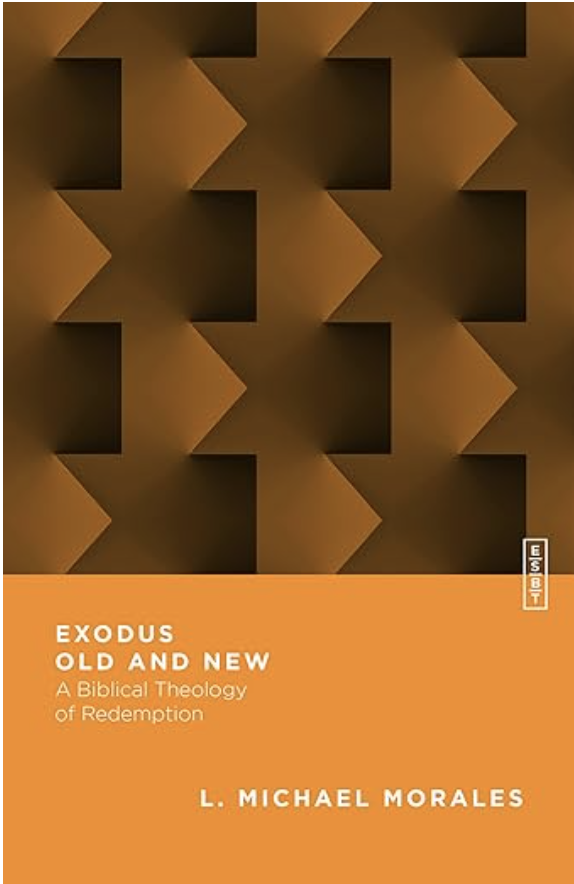Exodus Old and New: A Biblical Theology of Redemption
In Exodus Old and New, Michael Morales does an amazing job of detailing the biblical account of Israel's exodus out of Egypt in the Old Testament. In doing so, he also masterfully connects their historical redemptive event as a real-life picture that anticipated the New Testament's historical redemption found in Jesus Christ.

Morales explains that the old exodus becomes a type for the new exodus. Moses delivered Israel from Pharaoh, whereas Jesus delivers by ultimately saving all those from every nation that would believe in Him, thus the new exodus is the anti-type.
The focus of his book revolves around three key developments. He pulls them directly out of both the Old and New Testament narratives. The three realities are the Old Testament exodus out of Egypt, the second exodus foretold by the prophets, and finally, the new exodus in the New Testament accomplished by Jesus Christ.
It all begins with God's plan for Moses and the first exodus. In Chapter 5, Morales writes that the "Passover" event is the event that rightly portrays the first exodus. It is here we understand Israel's need to be redeemed.
God's judgment of death to all firstborn was only averted by God providing a substitutionary death of an animal as the firstborn Son. Israel applied this sacrificial blood on their doorpost, thus securing purifying atonement.
This "Passover" and its institution (the animal's body needed to be burnt over fire and then eaten as an act of consecration to the Lord) provided the importance and declaration of who Israel is and what He had accomplished in Old Testament history.
Morales makes clear this was not folklore but the necessary teaching and, most importantly, understanding what He delivers to His people by grace alone. Apart from God's plan and provision of the substitutionary death of the lamb, Israel would perish like the Egyptians.
If this Old Testament understanding by Morales does not make you see the connection to what the New Testament delivers in the perfect obedient life and death of Jesus Christ, then you have missed the point. In Morales' next emphasis, he begins to clearly underscore and explain through the Scriptures again, through the Old Testament prophets, the need and plan for another exodus.
This exodus would be predicted in prophecy, the anti-type of the first exodus. The prophets predicted a new and better exodus that would see the final fulfillment of the first exodus signified. It was Isaiah himself who depicts this throughout his book, culminating in Isaiah 53, that Israel, through the Servant of Yahweh, as the representative of Israel, is that prophetic figure who is portrayed as the suffering servant that will atone through His death, the rescue of many (both Jews and Gentiles).
Therefore the Old exodus is left in the rearview mirror and the true fulfillment of His upcoming exodus will be perfect and complete. This all-transforming exodus for Israel is vital to see. God moves the narrative from promises in the Old Testament to fulfillment in the New Testament. Morales makes all the connections to show that the servant of Yahweh (Isaiah 53) is the "Moses" of the new exodus.
Finally, the end of this great book culminates with the new exodus of the people of God, the Israel of God (Galatians 6:16), the church, who Christ redeems through His death. The Bible comes full circle to explain that from the very beginning, its most important message is the final redemption of His very own people through the exodus of Christ.
God's only Son has become the only source of eternal life. He alone leads His people in a new exodus out of the old creation and into the new creation, through His historic death (that was needed to save us from this present world) as our Passover Lamb of God.
I hope this short review of Michael Morale's book might compel you to read it. I think you will grow in your understanding of our great God and His Gospel because I did.
I will leave you with what is stated in the last sentence of his book. It is a quote from the Book of Common Prayer, referring to the God of the exodus. "O God, by the glorious resurrection of your Son Jesus Christ destroyed death and brought life and immortality to light: Grant that we, who have been raised with Him, may abide in his presence with You, and the Holy Spirit, be dominion and praise forever and ever. Amen."
More in Monthly Newsletter
May 1, 2024
The Christian Ethic of Joy and SufferingMay 1, 2024
Elders ReportMay 1, 2024
Deacons Report